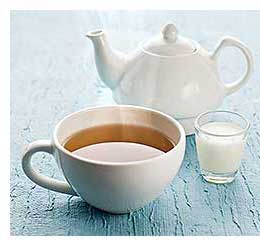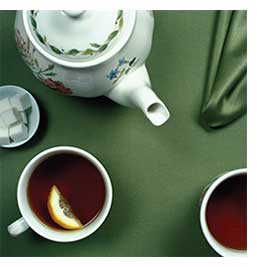Time to talk about tea
The amount of tea drunk in Britain comes to ridiculous figures which nobody can really grasp - more than 165 million cups a day, says the industry.
However, the meaningful figure for the hospitality industry is the proportion of this which is drunk out of home, through the catering trade. It is probably, at best, 10% of the nation's entire tea consumption.
The reasons for this are occasionally deliberately obscured by suggestions that the dramatic rise of coffee in the UK has taken over the hot beverage market.
This is simply not true. The reason that tea does not perform as well as it should in the hospitality trade is that the consumers do not trust it. At home, they can brew it exactly the way they like it - in a hotel or restaurant, they are at the mercy of the staff. And that reduces the public's trust in out-of-home tea.
In many ways, tea is a far more complex product than coffee, because even in everyday service it extends into the different brewing of blacks, whites and greens, herbal infusions, and then matchas, chais and the like. All need an understanding of different temperatures and brew times, but this is not the stuff a degree course is made of: these basics can be taught very quickly.
What dictates effective training is an essential management decision - how important is tea to the business, who is the target, what is the tea menu, and what kind of training will help the business develop?
The target is wider than might be expected, with a very high number of male tea drinkers. The contradiction between this and the current highest-profile part of the tea market, the emerging number of new boutique tea brands, was referred to recently by Patrick Cairns, the new CEO of Clipper Teas, when he said that his new push for the out-of-home market would be based on taste, not image.
"The question for Clipper now is of how a tea brand can deliver a superior taste instead of just being 'fluffy' - this is not a novelty brand!"
It cannot be coincidence that Jonathan Jones of Tregothnan, Britain's only commercial tea plantation, said at exactly the same time: "My theme is real men drink tea - they understand this in Berlin and Beijing, so Birmingham is next! Tea has been too girly for its own good."
And there lies a clue as to how tea training should be seen. An interesting example of combining practical tea training with image and with a defined target is that of Teapigs, a brand whose irreverence of approach covers a serious marketing point.
"The business logic of training is to sell more tea," says Nick Kilby, tea evangelist at Teapigs. "Staff who look at a customer and shrug their shoulders do not sell more tea - by contrast, one of our clients has just said that his staff enjoyed their training, and that within 10 minutes, he heard one of them telling a customer all about our teas. That's the perfect result!"
It is not always possible to get all staff together, says Teapigs, so they appoint a regular contact.
"We appoint one fully-trained point of contact, the house Tea Geek. They wear a 'prefect' badge, which makes it fun - we now get staff competing to wear it, but the point is that this has been proved to work in practice.
"A full day's training is just too much for the average member of staff - an hour or two for the basics of water temperature and infusion times gets them on their way. What is just as important is that we stay in contact with our Geeks once a month, with constant little tips."
Training is actually making this progress happen, says Jennifer Wood at Canton Tea. "The specialist tea sector is going through 
a boom, and we are now being approached by hotels and restaurants, who now know that serving fine wines but mediocre tea-bags is no longer acceptable. People who are paying a decent whack for a hotel, and used simply to accept 
the tea they were served, are now demanding better!
"There is a big current demand for natural tastes, against the ones which smell promising at first but taste like mud. A lot of specialities and herbals are manufactured teas, sprayed with nature-identical perfume, which is why they're incredibly cheap.
"We have great teas that deliver more on the taste than the smell, which surprises people… staff have to know the difference and be able to explain it."
Stories take you a long way, says Kasim Ali of the Waterloo Tea House in Cardiff. He straddles the sectors, as a tea-room owner who serves consumers daily, and also a wholesale supplier and trainer to hotels and restaurants.
The character of the training can make all the difference, Ali says. "It can often be more effective to take, say, a great Assam and a really bad one, and serve them side by side - then they get it. Or we will deliberately over-brew and under-brew the same tea - when they taste it wrong, they understand why it's important to get it right. Then they understand why they are putting that timer on the table!
"When they see, sniff and feel them, the teas become real. This is all far more useful 
training than a dogmatic approach to how to brew tea."
Ann Davis, founder of The Tea Experience, says: "Sometimes we over-think making tea. It is a fairly simple process, and if you build up skills gradually it soon comes together.
"Starting training with one teabag is worthwhile - even teabag tea can be made poorly, so taking a few minutes to coach someone how to do it properly may be the difference between one visit by a customer and repeated visits.
"Staff who are trained from a small start-up menu will learn quickly and establish confidence - they will speak knowledgeably and enthusiastically about those teas and encourage customers to try them. That will put you in a good position to decide whether to develop further."
Furthermore, agrees Tetley, the how-to-brew-it approach is not enough - training should not just cover the range of blends available and the best ways to make tea, but the most appropriate way to serve it, and even such aspects as storage - tea is very sensitive to light and other flavours, and putting the green and the Earl Grey next to each other is just inviting flavour transfers.
TEA ACCOLADES
There is recognition available for those who serve fine tea and serve it well. The Beverage Standards Association has brought out an assessment system which can be displayed, and the biggest prize in the sector is the Tea Guild awards.
A good supplier will aim towards this, says Allan Pirret, sales director at Novus.
"It is something we are very keen about, even if you don't think you want it! We have two levels of training plan, basic and champion, and we have helped several of our trade customers achieve the Tea Guild's award of excellence."
And there is a commercial incentive, he says. "It is typical for us to multiply a client's tea sales by four times - it is a combination of a great product, and informed staff who know what they are doing."
CONTACTS
Clipper 01308 863344www.clipper-teas.com
Tregothnan01872 520000www.tregothnan.co.uk
Canton0845 519 5575www.cantonteaco.com
Waterloo029 2045 6073www.waterlootea.com
Tea Experience01302 538906www.teaexperience.co.uk
Novus01621 776179www.novustea.co.uk
Tetley0845 606 6328www.tetleyforcaterers.co.uk










